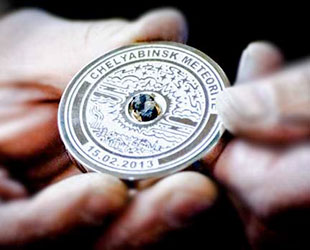Welcome to DU!
The truly grassroots left-of-center political community where regular people, not algorithms, drive the discussions and set the standards.
Join the community:
Create a free account
Support DU (and get rid of ads!):
Become a Star Member
Latest Breaking News
General Discussion
The DU Lounge
All Forums
Issue Forums
Culture Forums
Alliance Forums
Region Forums
Support Forums
Help & Search
Science
Related: About this forumOne Year Later: Russian Meteor is a Science Boon
Today, enshrined in Russia's folk memory as a big scare, the Chelyabinsk Meteorite, for space scientists, is a boon.
They say it has yielded unprecedented insights into the makeup and orbit of asteroids and the risks that a rogue rock may pose to Earth.
"It was a remarkable event," Mark Bailey, director of the Armagh Observatory in Northern Ireland, told AFP.
Only a few asteroids ever cross Earth's path. Fewer still survive the fiery contest of friction with the atmosphere. Those that do are likely to fall in the sea, which covers more than two-thirds of the planet, or in a remote area, such as desert, tundra or Antarctica.
http://news.discovery.com/space/asteroids-meteors-meteorites/one-year-on-russian-meteor-was-huge-science-boon-140212.htm
Chelyabinsk meteorite 'shrinks by 20kg' as skyfall anniversary approaches
Chelyabinsk is to celebrate one year since a meteorite hit the Siberian city with a scientific conference, a memorial stone and fireworks at the site of its landing. Meanwhile, the “birthday boy” from space has lost 20 kg in weight and got a bit rusty.
The “Happy Birthday, meteorite!” festival is to be held on the frozen shores of lake Chebarkul, where the 17-meter celestial rock smashed on February 15, 2013, after exploding and breaking into pieces above Chelyabinsk. The day will be marked with a scientific conference on causes and the aftermath of the meteorite fall – and unveiling a memorial marble stone to honor the rare space event.
The fall of the huge stray asteroid, whose spectacular fiery descent was filmed by numerous Russian dashcams, attracted scores of scientists and raised questions about chances the incident could repeat with somewhat more disastrous consequences.
The big rock was eventually put on display at the Chelyabinsk museum of local lore. There it dried out a bit, losing some 20 kilograms as water evaporated, according to the museum’s deputy scientific director Nikolay Antipin.

http://rt.com/news/chelyabinsk-meteorite-shrinks-anniversary-920/
Sochi Olympic gold medalists to get bonus meteorite medal

..
Saturday marks exactly one year since a small near-Earth asteroid entered the Earth's atmosphere over Russia and exploded over the Chelyabinsk Oblast (region). Regarded as the most widely-witnessed strike in modern history, the Chelyabinsk meteor was also the largest recorded natural object to have fallen from space since 1908.
The space rock broke into hundreds, if not thousands, of small fragments, which rained down over the area's snow-covered fields. Over the past year, many fragments of the Chelyabinsk meteorite have been recovered, with some of the pieces heading to labs for study, many landing on the collectors' market, others going to museums and a small set being placed aside for a special set of medallions.
Ten of those medals will be presented to those who place gold at the Sochi 2014 Olympics on the anniversary of the Chelyabinsk meteor fall.
http://www.collectspace.com/news/news-021214a-olympics-medals-chelyabinsk-meteorite.html
InfoView thread info, including edit history
TrashPut this thread in your Trash Can (My DU » Trash Can)
BookmarkAdd this thread to your Bookmarks (My DU » Bookmarks)
1 replies, 1358 views
ShareGet links to this post and/or share on social media
AlertAlert this post for a rule violation
PowersThere are no powers you can use on this post
EditCannot edit other people's posts
ReplyReply to this post
EditCannot edit other people's posts
Rec (5)
ReplyReply to this post
1 replies
 = new reply since forum marked as read
Highlight:
NoneDon't highlight anything
5 newestHighlight 5 most recent replies
= new reply since forum marked as read
Highlight:
NoneDon't highlight anything
5 newestHighlight 5 most recent replies
One Year Later: Russian Meteor is a Science Boon (Original Post)
jakeXT
Feb 2014
OP
jakeXT
(10,575 posts)1. Happy 1st Anniversary Chelyabinsk! The Fireball that Woke Up the World
Happy 1st Anniversary Chelyabinsk! The Fireball that Woke Up the World
http://www.universetoday.com/109376/happy-1st-anniversary-chelyabinsk-the-fireball-that-woke-up-the-world